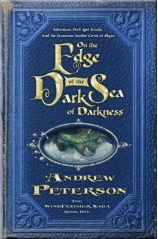What do you get when you take a talented songwriter, put him in a fantasy land, and allow him some whimsy as he tells a story? You would do pretty doggone good if you ended up with On the Edge of the Dark Sea of Darkness.
Andrew Peterson has made several critically acclaimed albums, and now he turns his talent to a tale of adventure, peril, lost jewels, and the fearsome toothy cows of Skree. Edge is the first book in the Wingfeather Saga. It is being marketed as a young adult (YA) series, but it is such an enchanting tale it shouldn’t be missed by an adult audience.
 The story features Janner Igiby, his brother Tink, and their crippled sister Leeli as they go to enjoy the Dragon Day festival in their town of Glipwood. These three children live with their mother Nia and their peglegged ex-pirate grandpa Podo, and they are greatly loved. Their life would be perfect, if not for the occupation of Skree by the Fangs of Dang, led by a Nameless Evil (called Gnag the Nameless). Janner, as the oldest, is tasked with keeping an eye on his siblings, but finds this duty is harder to fulfill than originally planned. Soon they are in the midst of great adventure and danger, such as haunted houses, aforementioned toothy cows, sock men, and giant Nuggets.
The story features Janner Igiby, his brother Tink, and their crippled sister Leeli as they go to enjoy the Dragon Day festival in their town of Glipwood. These three children live with their mother Nia and their peglegged ex-pirate grandpa Podo, and they are greatly loved. Their life would be perfect, if not for the occupation of Skree by the Fangs of Dang, led by a Nameless Evil (called Gnag the Nameless). Janner, as the oldest, is tasked with keeping an eye on his siblings, but finds this duty is harder to fulfill than originally planned. Soon they are in the midst of great adventure and danger, such as haunted houses, aforementioned toothy cows, sock men, and giant Nuggets.
This book reminds me of the movie and book The Princess Bride. Peterson creates a well-thought out fantasy world that has a wink and a nod to it. The reader can tell he had fun writing it, and the enjoyment comes out in the little goofiness sprinkled throughout. He creates little touches like fake references to Skreean literature such as “Taming the Creepiful Wood” (in footnotes, of all places!), and having examples of the shovel request form in the appendix.
The characters resonate, from gruff Podo to the bookish Oskar N. Reteep. The action moves along with 51 short, well-paced chapters. The tone is often kept a little light, but the tension areas will still have the kids holding onto a pillow and begging for one more chapter. The story is not an allegory, and there is not a strong overt spiritual tone (keeping in line with books like Narnia), but the underlying theme is potent for those with eyes to see.
I greatly enjoyed the book overall. It was a quick read, yet I can still pick it up while preparing for this post and find myself delighting in the story. There are a few points where he jumps into another character’s head, making me as a reader stop and wonder what just happened to the perspective. However, these are few and minor overall. I must state a warning though: reading this book in public may cause you to be the recipient of funny looks from people, as you read a clever passage, process it, and giggle like you just got a joke.
If you want to read a witty, light-hearted, yet poignant tale from a talented new author, then pick up Edge and enjoy the ride. When you’re done, you’ll be saying along with many others it’s “jouncey as a two-ton bog pie.”
I fell behind in my Blog reading. Had no idea you’d hurt your wrist! Wow, hard to do much of anything, I imagine.
Thanks for sticking with the tour. Your review is great.
I also enjoyed your posts about sovereignty. Great question—how to resolve the belief in a sovereign God and the need to create a character who acts. I just commented over on Chawna’s blog that I think a number of Christian novels fall short in creating an engaging character. I wonder if this in part explains the issue.
I actually had the same question confront me when I was well on my way in The Lore of Efrathah. Time will tell if I solved it satisfactorily or not.
Becky